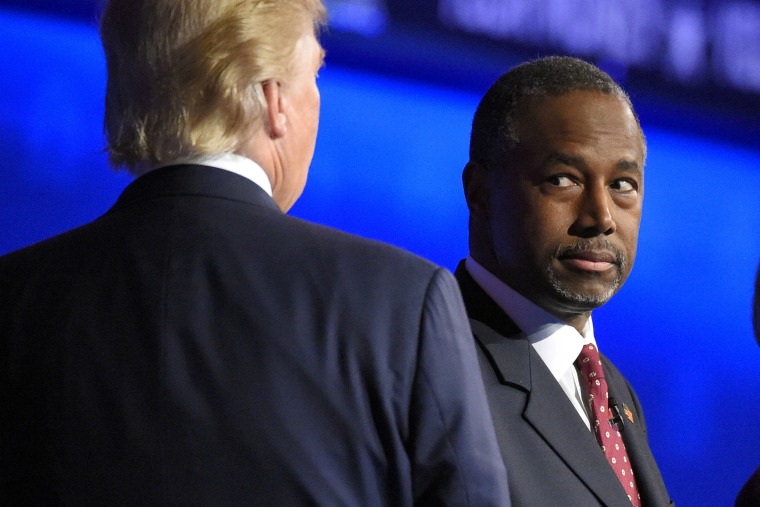This was the first debate where Carson was a true front-runner, with all the added attention that entails. If the debate’s any indication, he’s still shaky in the role and he seemed to raise more questions about his positions and biography than he answered. Asked about his call for a flat tax based on Biblical tithing, Carson struggled to articulate his plan after telling moderators the original figure he floated -- 10% -- was only an “analogy” and that estimates that he would blow a huge hole in the deficit were inaccurate despite his calls for drastic cuts from current tax rates. He said he would eliminate “all the deductions” and “all the loopholes” to make up some costs, which sets him up this week for follow ups of whether he would preserve popular items like the mortgage deduction or charitable deductions and -- if not -- how he could claim his plan would be anywhere near deficit-neutral.
Is Ben Carson debate-proof?
By any fair measure, Ben Carson is a terrible debater. The question is whether or not Republican primary voters will care.

What makes a presidential candidate a good debater? Ideally, we'd look for candidates who are articulate and knowledgeable, who can speak of a wide variety of issues with confidence and fluency, and who convey information in an engaging, honest, and accessible way.
And by all of these metrics, Ben Carson is a terrible debater. Dreadful, really. This recap from MSNBC's Benjy Sarlin rings true.
At another point in the debate, Carson was asked about his involvement in "a company called Mannatech, a maker of nutritional supplements, with which you had a 10-year relationship. They offered claims that they could cure autism, cancer, they paid $7 million to settle a deceptive marketing lawsuit in Texas, and yet your involvement continued." The candidate was asked why he associated himself with such an outfit.
"Well, that’s easy to answer," Carson responded. "I didn’t have an involvement with them. That is total propaganda, and this is what happens in our society. Total propaganda."
The retired neurosurgeon was either lying of he doesn't remember the "long and personal involvement with Mannatech" he maintained over several years. Unless Carson believes "propaganda" is synonymous with "facts," his answer was ridiculous.
Steve Deace, a conservative radio host and Ted Cruz supporter, told MSNBC last night, “I think you saw tonight, and Ben’s a great guy, issue-wise he’s out of his depth."
That seems more than fair. The question is whether or not it will matter.
By any fair assessment, Carson's first two debate performances were no better than last night's. The GOP doctor generally seems half-awake, delivering rambling answers that tend to crumble when subjected to any real scrutiny.
But in the weeks that followed those debates, Carson's support -- in polls and in fundraising -- went up quite a bit. Indeed, some recent polling suggests he's leading the entire Republican field, even passing Donald Trump in Iowa.
All of which leads one to wonder whether Carson is simply debate-proof. Perhaps it doesn't much matter whether or not he delivers impressive performances because, for Carson's loyal fans, his debate appearances have no bearing on his support?
It's not a sustainable model over the long haul, because in time, Carson will need to appeal to a broader and more diverse group of voters. But in the meantime, it's entirely possible, if not likely, that Carson will continue to do very well among far-right voters no matter how poorly he does in events like last night's debate.